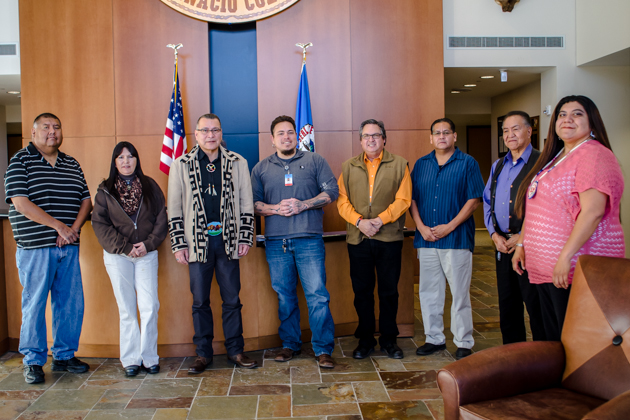AIANTA (American Indian Alaskan Native Tourism Association) is a non-profit association whose purpose is to introduce, grow, and sustain American Indian, Alaskan Native, and Native Hawaiian tourism that honors traditions and values. The association is structured to serve as the voice and resource for its constituents, training, and educational resources to tribes, tribal organizations, and tribal members.
Formed in 1999, the association is made up of tribal members from six regions: Eastern, Plains, Midwest, Southwest, Pacific, and Alaska.
The association paid a visit to the Tribe on Wednesday, Jan. 28 to address the opportunities of bringing tourism to the Southern Ute Indian Reservation. The goal is to educate foreigners about the traditions of native communities across Indian Country, while implementing a strong understanding of American Indian heritage. Camille Ferguson, director of AIANTA, and Edward Hall III from the Bureau of Indian Affairs were the guests who spoke with Tribal Council about these opportunities.
“Since we started, we found out the international market wants to know more about the indigenous people,” Camille Ferguson said. “We have the opportunities to bring people to different nations and learn about our history, who we are, and what we do as indigenous people.”
“Tourism is one of the top industries in the world,” Edward Hall said. “It’s a multi-billion dollar industry. All of these international cultures are interested in our culture. The opportunity is there, we just want to make sure the support is there. Tourism isn’t just about economic development, it’s also about education.”
AIANTA’s main intention is to provide a cultural understanding for tourists so they can bring a piece of culture home with them. With plenty of stories involving the indigenous people, AIANTA is encouraging community members to share any stories of heritage with the association. These stories can involve any attachment with the Tribe throughout its historical years, Hall said.
“Anyone can be apart of AIANTA,” Hall addressed. “If you to travel to different parts of Indian Country, we want you to tell us about it. There are plenty of opportunities for interpretation, and if people want to share their stories, then we allow that. [Many] people think our culture has been absorbed with no organized communities. But they grow excited when they learn we are here and we survived.”
Tribal members interested in sharing stories with AIANTA may do so on their website, www.ainta.com or post to their official Facebook page. The association also has a newsletter that community members have access to.
“Tourism is not a passive thing,” Hall concluded. “It also involves cross-cultural exchange. People come into a community with their own expectations and understanding. We want to make sure people identify the base quality of live. It’s an exchange of values. We have to understand their perspective and in return, they have to understand us.”

